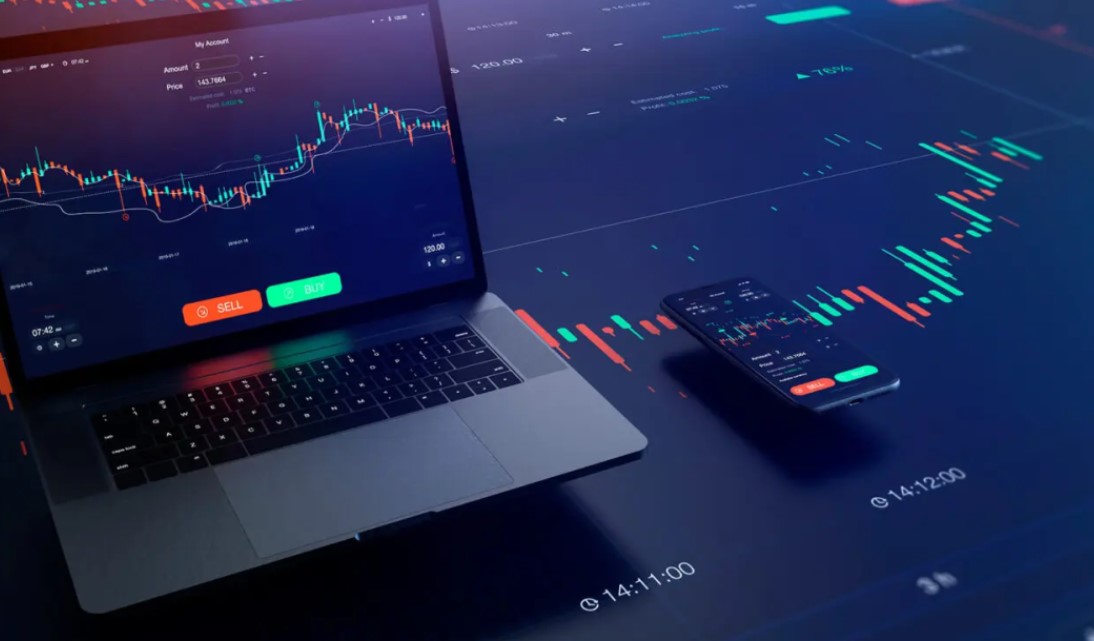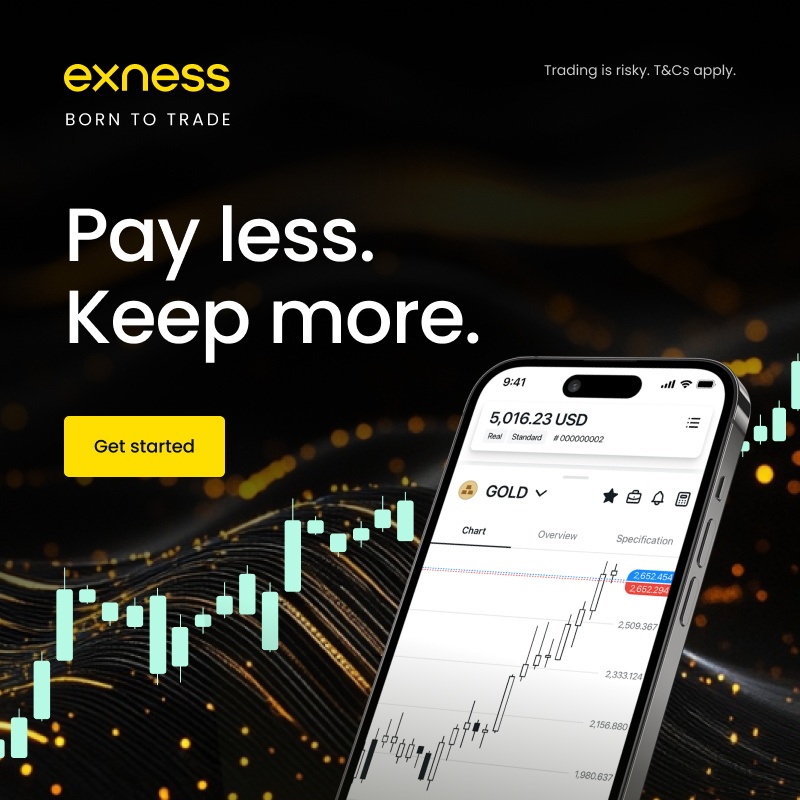
10 minute read
How to Start Forex Trading in Dubai: A Comprehensive Guide
from Exness
by Exness_Blog
Forex trading, also known as foreign exchange trading, has become increasingly popular in Dubai, a global financial hub renowned for its business-friendly environment and strategic location. With its robust economy, advanced infrastructure, and access to international markets, Dubai offers an ideal setting for aspiring forex traders. Whether you're a beginner or an experienced investor looking to diversify, starting forex trading in Dubai can be a rewarding venture if approached correctly. This comprehensive guide will walk you through the essential steps to begin forex trading in Dubai, covering everything from understanding the market to selecting a broker and managing risks, all while adhering to local regulations.
Top 4 Best Forex Brokers in Dubai
1️⃣ Exness: Open An Account or Visit Brokers 🏆
2️⃣ XM: Open An Account or Visit Brokers 💥
3️⃣ JustMarkets: Open An Account or Visit Brokers ✅
4️⃣ Quotex: Open An Account or Visit Brokers 🌐
What is Forex Trading?
Forex trading involves buying and selling currencies in the global foreign exchange market to profit from fluctuations in exchange rates. The forex market is the largest and most liquid financial market in the world, with a daily trading volume exceeding $7 trillion. Traders speculate on the price movements of currency pairs, such as EUR/USD or GBP/JPY, aiming to buy low and sell high or vice versa.
In Dubai, forex trading has gained traction due to the city’s tax-free environment, high-speed internet, and access to international brokers. However, success in forex trading requires knowledge, discipline, and a strategic approach. Below, we outline the key steps to start forex trading in Dubai effectively.
Step 1: Understand the Basics of Forex Trading
Before diving into forex trading, it’s crucial to grasp the fundamentals. Here’s a quick overview:
· Currency Pairs: Forex trading involves trading currency pairs, categorized into major, minor, and exotic pairs. Major pairs, like EUR/USD, are the most traded and have high liquidity.
· Pip and Lot Sizes: A pip is the smallest price movement in a currency pair, while a lot represents the trade size. Understanding these terms is essential for calculating profits and losses.
· Leverage and Margin: Leverage allows traders to control larger positions with smaller capital. However, it also increases risk. Margin is the amount required to open a leveraged position.
· Market Analysis: Traders use technical analysis (charts, indicators) and fundamental analysis (economic news, geopolitical events) to predict price movements.
To build your knowledge, consider enrolling in online courses, reading books like Currency Trading for Dummies, or following reputable forex blogs. Many brokers also offer free educational resources, including webinars and tutorials.
Step 2: Research the Forex Trading Environment in Dubai
Dubai’s unique financial landscape makes it an attractive destination for forex trading. Here’s what you need to know about the local environment:
· Regulatory Framework: Forex trading in Dubai is regulated by the Dubai Financial Services Authority (DFSA) for firms operating within the Dubai International Financial Centre (DIFC). Outside the DIFC, the Securities and Commodities Authority (SCA) oversees forex brokers. Always choose a broker regulated by these authorities or reputable international bodies like the FCA (UK), ASIC (Australia), or CySEC (Cyprus).
· Tax Benefits: Dubai is a tax-free jurisdiction, meaning you won’t pay capital gains tax on forex trading profits. This makes it financially appealing for traders.
· Market Access: Dubai’s time zone (GST) aligns well with major forex markets in Europe and Asia, allowing traders to capitalize on peak trading hours.
Researching the local market will help you understand the opportunities and challenges of forex trading in Dubai. Stay updated on regulatory changes by visiting the DFSA or SCA websites.
Step 3: Choose a Reliable Forex Broker
Selecting the right forex broker is critical to your success. Here are key factors to consider when choosing a broker in Dubai:
· Regulation: Ensure the broker is regulated by the DFSA, SCA, or a reputable international authority. This guarantees the safety of your funds and fair trading practices.
· Trading Platform: Popular platforms like MetaTrader 4 (MT4) or MetaTrader 5 (MT5) are user-friendly and widely used. Check if the broker offers a platform that suits your trading style.
· Account Types: Look for brokers offering account types tailored to your experience level, such as micro accounts for beginners or ECN accounts for advanced traders.
· Spreads and Fees: Compare spreads (the difference between bid and ask prices) and commissions. Low spreads are ideal for frequent traders.
· Customer Support: Choose a broker with 24/5 customer support, as forex markets operate around the clock.
· Deposit and Withdrawal Options: Ensure the broker supports convenient payment methods, such as bank transfers, credit cards, or e-wallets like Skrill.
Some reputable brokers operating in Dubai include Exness, Saxo Bank, and XM. Always read reviews and test a broker’s demo account before committing.

💥 Trade with Exness now: Open An Account or Visit Brokers 🏆
Step 4: Open a Forex Trading Account
Once you’ve chosen a broker, follow these steps to open a trading account:
· Complete the Application: Visit the broker’s website and fill out the registration form. You’ll need to provide personal details, including your name, address, and contact information.
· Verify Your Identity: Submit identification documents, such as a passport or Emirates ID, and proof of address (e.g., a utility bill). This complies with Know Your Customer (KYC) regulations.
· Choose an Account Type: Select an account that matches your experience and capital. Beginners should start with a micro or demo account to practice without risking real money.
· Deposit Funds: Fund your account using a secure payment method. Most brokers in Dubai accept deposits in AED, USD, or EUR.
· Download the Trading Platform: Install the broker’s trading platform (e.g., MT4 or MT5) on your computer or mobile device.
Before trading with real money, practice on a demo account to familiarize yourself with the platform and test your strategies.
Step 5: Develop a Trading Plan
A solid trading plan is the backbone of successful forex trading. Here’s how to create one:
· Set Clear Goals: Define your financial objectives, such as earning a specific monthly profit or building long-term wealth.
· Choose a Trading Style: Decide whether you’ll be a day trader, swing trader, or position trader based on your time commitment and risk tolerance.
· Risk Management: Never risk more than 1-2% of your capital on a single trade. Use stop-loss orders to limit potential losses.
· Trading Strategy: Develop a strategy based on technical or fundamental analysis. For example, you might use moving averages for trend trading or monitor economic calendars for news-based trading.
· Track Performance: Keep a trading journal to record your trades, analyze mistakes, and refine your strategy.
Consistency and discipline are key. Avoid emotional trading and stick to your plan, even during market volatility.
Step 6: Stay Compliant with Dubai’s Regulations
Compliance with local regulations is essential to avoid legal issues. Here are some tips to stay compliant:
· Work with Regulated Brokers: Only trade with brokers licensed by the DFSA, SCA, or reputable international regulators.
· Understand Leverage Limits: The DFSA imposes leverage caps to protect retail traders. For example, leverage for major currency pairs is typically limited to 30:1.
· Report Income if Required: While Dubai doesn’t impose capital gains tax, residents of other countries may need to report forex profits to their home tax authorities.
· Avoid Scams: Be wary of unregulated brokers or “get-rich-quick” schemes promising guaranteed profits. Always verify a broker’s credentials.
If you’re unsure about compliance, consult a financial advisor familiar with Dubai’s regulations.
Step 7: Manage Risks Effectively
Forex trading carries significant risks, and protecting your capital is crucial. Here are some risk management tips:
· Use Stop-Loss Orders: Set stop-loss orders to automatically close trades at a predetermined loss level.
· Diversify Trades: Avoid putting all your capital into a single currency pair. Spread your risk across multiple trades.
· Limit Leverage: While leverage can amplify profits, it also magnifies losses. Use leverage conservatively, especially as a beginner.
· Stay Informed: Monitor economic events, such as interest rate decisions or geopolitical developments, that can impact currency prices.
· Control Emotions: Fear and greed can lead to impulsive decisions. Stick to your trading plan to avoid costly mistakes.
Step 8: Leverage Technology and Tools
Technology plays a vital role in forex trading. Here are some tools to enhance your trading experience:
· Trading Platforms: Use MT4 or MT5 for advanced charting, indicators, and automated trading features.
· Economic Calendars: Track upcoming economic events that could affect currency prices.
· Trading Apps: Many brokers offer mobile apps, allowing you to trade on the go. This is especially useful in Dubai’s fast-paced environment.
· Automated Trading: Explore expert advisors (EAs) or trading bots for automated strategies, but test them thoroughly on a demo account first.
Step 9: Build a Network and Stay Educated
Forex trading is a continuous learning journey. To stay ahead, consider the following:
· Join Trading Communities: Connect with other traders in Dubai through online forums, social media groups, or local meetups. Platforms like X can provide real-time insights from experienced traders.
· Attend Workshops and Seminars: Dubai frequently hosts financial expos and trading seminars. Attend these events to learn from industry experts.
· Follow Market News: Stay updated on global economic trends through sources like Bloomberg, Reuters, or Forex Factory.
· Learn from Mistakes: Review your trades regularly to identify patterns and improve your strategy.
Step 10: Start Small and Scale Up
As a beginner, start with a small investment to minimize risk. Focus on mastering your trading strategy and building confidence. Once you achieve consistent results, gradually increase your trading capital. Avoid the temptation to overtrade or chase losses, as this can lead to significant setbacks.
Why Dubai is Ideal for Forex Trading
Dubai’s strategic advantages make it a prime location for forex trading:
· Tax-Free Profits: No capital gains tax means you keep more of your earnings.
· World-Class Infrastructure: High-speed internet and advanced technology ensure seamless trading.
· Global Connectivity: Dubai’s proximity to major financial markets allows traders to capitalize on international opportunities.
· Diverse Broker Options: The city attracts top-tier brokers, giving traders access to competitive services.
By leveraging these benefits and following the steps outlined above, you can build a successful forex trading career in Dubai.
Common Mistakes to Avoid
To maximize your success, steer clear of these common pitfalls:
· Lack of Education: Trading without understanding the market is a recipe for failure. Invest time in learning.
· Overleveraging: High leverage can wipe out your account if not used carefully.
· Ignoring Risk Management: Failing to set stop-loss orders or risking too much capital can lead to significant losses.
· Emotional Trading: Letting emotions drive your decisions often results in poor outcomes.
· Choosing Unregulated Brokers: Always verify a broker’s regulatory status to protect your funds.
Conclusion
Starting forex trading in Dubai is an exciting opportunity for those willing to invest time and effort. By understanding the market, choosing a regulated broker, developing a solid trading plan, and managing risks, you can navigate the forex market with confidence. Dubai’s tax-free environment, advanced infrastructure, and regulatory oversight make it an ideal destination for traders. Begin with a demo account, stay disciplined, and continuously educate yourself to achieve long-term success.
Ready to take the plunge? Research reputable brokers, open a demo account, and start your forex trading journey in Dubai today. With patience and persistence, you can turn your trading aspirations into reality.
💥 Note: To enjoy the benefits of the partner code, such as trading fee rebates, you need to register with Exness through this link: Open An Account or Visit Brokers 🏆
Read more:

